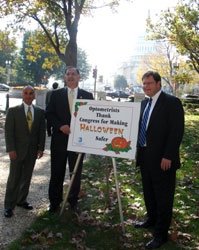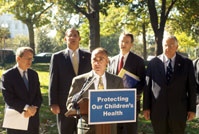AOA-backed Decorative Contact Lens Bill Approved
AOA-backed Decorative Contact Lens Bill Approved by Congress
- Text of Public Law 109-96
- Representative Boozman Press Release
- Senator Enzi Press Release
- Impact of Public Law 109-96
CONGRESS TREATS CONSUMERS TO CONTACT LENS SAFETY BILL IN TIME FOR HALLOWEEN
Optometrist and U.S. Representative John Boozman Meets Goal of Final Passage in Time to Warn Costume Wearers about Misuse of Decorative Contact Lenses
Washington – October 26, 2005 – Doctors of Optometry saluted the U.S. House of Representatives today for its timely final approval of a bill (S.172) to protect Americans from eye injuries due to the misuse of zero power “decorative” contact lenses. Rep. John Boozman (R-AR) led the bi-partisan effort to pass S. 172 and close a 2 1/2 year old loophole that, in spite of warnings by the nation's eye care providers and Federal health officials, has allowed decorative contact lenses to be considered an unregulated cosmetic rather than a regulated medical device. With mounting evidence of grievous harm resulting from the unsupervised use of decorative lenses provided to Congress by the American Optometric Association (AOA) and other organizations, the U.S. Senate acted first and approved S. 172 in July with strong support from Senators Michael Enzi (R-WY), Mike DeWine (R-OH) and Edward Kennedy (D-MA). President Bush signed the bill into law on November 9, 2005.
 |
 |
"The unregulated, unsupervised use of decorative contact lenses has been shown to be extremely hazardous to one's health and I am pleased that Congress has now adopted my solution to this problem," said Rep. Boozman, a practicing optometrist for 25 years prior to his election to Congress and the chief House sponsor of the legislation. "By acting before Halloween, Congress is telling parents and young adults that decorative contact lenses, like contact lenses intended for correcting vision, present serious risks to eye health if they are used without the appropriate involvement of a qualified eye care professional."
“Rep. John Boozman and his colleagues in Congress have acted decisively today to restore an eye health protection that consumers need and deserve,” said Richard L. Wallingford, president of the AOA. "Optometry was proud to support Rep. Boozman's leadership in making passage of his contact lens safety legislation a top priority this year. In fact, we spared no effort in educating our patients and our elected officials in Washington about the dangers of unregulated decorative lenses and today's result shows it."
Decorative contact lenses -- often with striking colors or an unusual design -- have become an increasingly popular addition to Halloween and other costumes worn mostly, but not exclusively, by high school and college students. Although marketing of the lenses appears to increase before Halloween, they have been available directly to consumers year-round, including through the Internet, flea markets, gas stations and convenience stores.
The improper use of decorative contact lenses can cause permanent eye injury or potentially lead to blindness. Since 2003 the FDA has issued warnings to consumers and has acknowledged receiving reports of corneal ulcers associated with wearing decorative lenses as well as other conditions leading to infections and permanent loss of vision. Other risks associated with the use of decorative contact lenses include conjunctivitis (an infection of the eye), corneal edema (swelling), allergic reaction and corneal abrasion due to poor lens fit.
“Decorative and other non-corrective contact lenses, dispensed without a prescription or fitting from licensed professionals, have been linked to corneal ulcers and other ophthalmic problems,” said Senator Enzi, Chairman of the U.S. Senate Committee on Health, Education, Labor and Pensions. “That’s a health risk that needs our attention, and I’m pleased that Congress has taken action to give the Food and Drug Administration greater authority to protect users of these products, particularly children and adolescents, from unsafe and unregulated non-corrective lenses.”
In January 2005, the AOA launched an aggressive nationwide grassroots effort to educate members of Congress and the general public about unsupervised decorative contact lens misuse and to build support for S. 172. Hundreds of doctors of optometry from across the U.S. traveled to Washington, D.C. in April to hold face-to-face meetings with congressmen and senators and deliver detailed fact sheets on the bill. More recently, on October 7th, the AOA joined with other ophthalmic organizations in a special Capitol Hill briefing aimed at providing lawmakers with the most up-to-date information on the misuse of decorative contact lenses.
"I'm particularly proud that the AOA backed my bill so strongly from day one, and that its lobbying efforts helped make the issue a priority for Congress in 2005," Boozman added.
Other key supporters of the legislation include Reps. Joe Barton (R-TX), Nathan Deal (R-GA) and Henry Waxman (D-CA).
